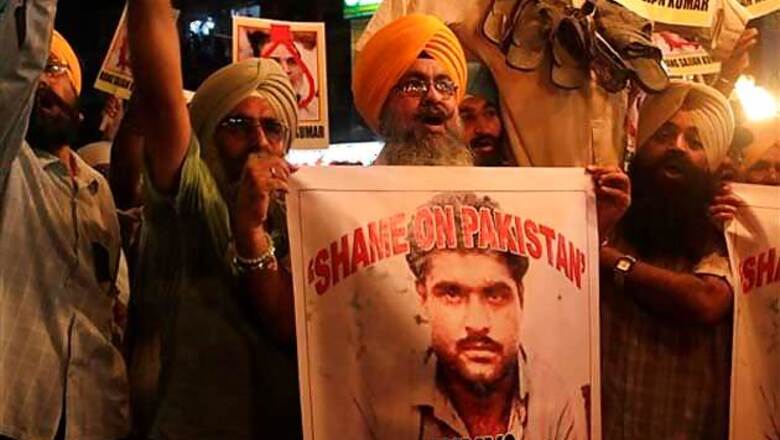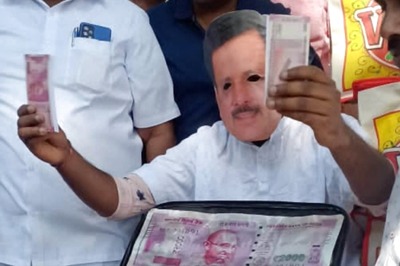
views
Has the death of Sarabjit Singh in an attack inside a high security Pakistani jail put paid to any possibility of a rapprochement between New Delhi and Islamabad? Security analyst Praveen Swami joined IBNLive readers for an interaction on the issue.
Q. Sir, now that a Pakistani prisoner has been attacked as well,does that make the act equation balancing one?and doesn't the array of questions thrown at Pakistan boomerang back at us? is the situation alarming considering Chinese activities adding to the tension? Asked by: pallavi sakhare
A. Pallavi, I think the broader questions-the strategic situation with China and Pakistan-are important, but not immediately relevant here. The key fact is that a Pakistani prisoner has been killed, and this despite express instructions from the Ministry of Home Affairs to raise protection for them. It doesn't speak well of India-and given the high moral tone the government has been taking, is certainly a huge embarrassment.
Q. When Shahrukh khan frisked at US airport there are so many hue and cry, but when it comes to national security, integrity and dignity of Indian hindus outside India, why the govt is so timid and cowardice in approach. Whether there is any nationality feeling at the highest level or everything is just vote bank politics? They only care about their seats (to be in the Govt) ? Is it a congress character? Asked by: Satya
A. Satya, I don't think there is any call to bring in Hindu-Muslim questions, or any other communal issues, into this particular discussion--whatever your disagreements with the Congress may be, the Sarabjeet Singh issue ran through the course of non-Congress governments, true. The truth is it is very difficult for any government to do very much about the legal processes in a foreign country, hostile or friendly. Sarabjit Singh was, rightly or wrongly, convicted of a capital crime in Pakistan, and we can't compel them to let him go-any more than we can compel the US to hand over David Headley, or the British could compel us to hand over Peter Bleach, the Purulia accused. Its easy to say the government should have done more-but, frankly, I'd like to exactly what that "more" should have been.
Q. Historically we have seen this docile foreign policy of continuous talks has not given us any desired results. should India's foreign policy should be belligerent ..compounded by the Chinese incursion? Asked by: Krishy259
A. Krishy, geopolitics isn't about belligerence or docility, its about a dispassionate appraisal of what our options are, and which one is the best. Firstly, it isn't true that our policies have been docile-if you read our own official war history of 1962, you'll see that we got ourselves into trouble because of mindless aggressiveness (http://www.bharat-rakshak.com/ARMY/History/1962War/PDF/). Here, the question is: what are India's goal, and how do we get to it? The big strategic goal is, obviously, rapid economic progress. So, we have to ask, does war help that end? If not war, what can we do? One suggestion is to use covert options to retaliate against Pakistan, but there is also a risk they could also escalate-again creating problems. So, costs and benefits have to be weighed. National strategy is about national benefit, not ego.
Q. Why doesn't the country recognise people it has sent across the border? Many of them have come back and said so. Why does Daniel have to pull a rickshaw when he was sent across by the RAW? Asked by: Raqib
A. I agree, Raqib, India hasn't cared for its agents-and neither, I can tell you, does Pakistan. Part of the reason is our sahib-naukar syndrome. Top officials rarely dirty their hands with actual operations (there are some honourable exceptions), and leave the dirty work to paid agents, often poor. But tell me, does India care for anyone who does national service? Do we pay people who clean our sewers--and save thousands of lives by making sure cholera doesn't break out in our cities--properly? Do we look after industrial workers in hazardous environments? Personally, I think Indians love big patriotic talk-but very few actually care about our people.
Q. Don't you think everybody is blowing this out of proportion. This surely can't derail talks. What's your opinion? Asked by: Mahesh
A. No, this won't: one person's life or death doesn't change relations between nations. But, for all practical purposes, talks have been derailed since 2008-the dialogue on Kashmir basically ended after President Pervez Musharraf was forced out of office, and there's been no significant progress on anything from terrorism to Siachen or Sir Creek. There have been some limited gains, like visa-free entry for the elderly. However, the reality is that things are at a stalemate-and with things headed the way they are in Pakistan, I doubt very much there's going to be a government in the near future willing to make the concessions that might secure a wider agreement.
Q. Do you think that our soft stance against Pakistan is because of the government to appease Muslims in India? If yes, then do you think Indian Muslims side with Pakistan no matter what the real issue is? Asked by: Siddharth
A. I disagree with your premise, which is there is a "soft" stand. There's a helpless stand, perhaps, but that helpless stand is one shared by the whole world-how do you deal with a nuclear-armed state, that is bent on slashing everyone's faces and then its own wrists? Like I just said, its easy to say we should be tougher-but what that means in practical terms, and what benefits it will have, aren't easy questions to answer. I think its easy to get emotional about these questions, but its also incumbent on all of us to reflect carefully on what actions we take-because all the choices will have consequences for us as a nation.
Q. Can Sarabjit's death hamper Indo-Pak talks for better ties? Asked by: fatima
A. Sadly, Fatima, yes-I think what we're seeing now is the consequence of a bubbling frustration with the government, on foreign policy *and* domestic issues. The truth is Prime Minister Manmohan Singh's policies haven't brought about the gains that were promised or advertised-and there's anger that India is apparently helpless in the face of violence. Now, the reality isn't as simple as that, but the bottom line is many people just don't trust the government-on Pakistan or anything else. That makes it impossible for politicians to persuade the public that the give-and-take needed for better relations is worthwhile.
Q. We hear that china is making more and more friends since many years like Sri Lanka, china and some African countries by investing in them. Does the Indian government underestimate the need for such measures or is it plain lazy? Asked by: Siddharth
A. Well, with an economy much bigger than ours, China is obviously in a position to make far larger investments across the globe than us! Money talks. The Indian government understands this well-but knows it can't change things unless its richer. Prime Minister Manmohan Singh believes, rightly or wrongly, that regional peace is essential to growing the economy-and has been willing, basically, to suck it up in the face of provocation towards that end.




















Comments
0 comment